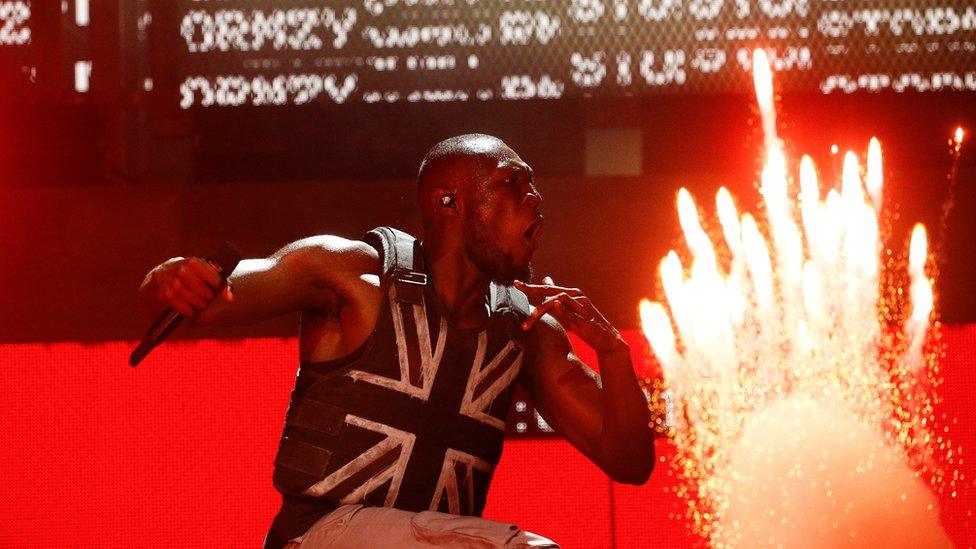NHS and 'remarkable' hospital radio inspire Mystery Jets song
- Published

Harrison has regularly spent time in hospital with issues stemming from his condition
Mystery Jets singer Blaine Harrison has said his new song is shaped by the "frustrations and fears" about the future of the NHS.
"In the post-austerity era of cuts, one of the communities that have felt the most is the disabled community," said the singer, who has spina bifida.
Hospital Radio, the band's first new music since 2016, is also inspired by hundreds of hospital stations still in operation around the UK.
"It's because of volunteers," he added.
The indie band have spent the past week visiting hospital radio stations and talking about the new single.
"It's been remarkable seeing the love that goes into keeping them alive," said Harrison, 34. He was born with spina bifida, external, which has affected his spine and leg muscles since he was a child.
Since 2009, he also been patron of the Attitude is Everything charity, which works with UK music venues to make gigs accessible for disable people.
"I was taken ill and had to spend an extended period of time in hospital, which is a fairly regular occurrence for me due to my disability," he told BBC News.
"I didn't have an instrument with me in the hospital so I was really just writing lyrics. It [Hospital Radio] is a compound of several different failed songs which I ended up stitching together.
Allow X content?
This article contains content provided by X. We ask for your permission before anything is loaded, as they may be using cookies and other technologies. You may want to read X’s cookie policy, external and privacy policy, external before accepting. To view this content choose ‘accept and continue’.

"The lyrics are, compared with some of our stuff, quite freeform and stream of consciousness. It could be construed as angry or pointed, but that's down to interpretation and I like to not to give too much away."
The lyrics include the lines: "When you're lying in your bed, old, soiled and screaming/Wondering when the hell it all went wrong/Wired up to keep your cold, cold heart beating/We will be the pill on the end of your tongue."
If the precise target of the lyrics is vague, the singer did say he felt a "prang of horror" during US President Donald Trump's recent state visit to the UK when he told the press the National Health Service - which celebrated its 70th anniversary in 2018 - would be part of any future trade negotiations between the two countries.
"My frustration and fears came from being wary and concerned about what the future of the NHS would hold, especially in the post-austerity era of cuts," Harrison said. "One of the communities that have felt the most is the disabled community with living incomes being cut and people being reassessed. But also the older generation.
"There's an ageing population and something that feels very personal is the threat of people falling through the cracks."
The NHS was "not perfect", Harrison admitted, adding that "people are well within their rights to complain about long waiting lists and I've been on some very long waiting lists for surgery in the past".
However, he said: "I've genuinely only ever felt incredibly fortunate and filled with gratitude towards the treatment I've had in NHS hospitals and I've spent time in most of them in London and the south-east."
The political undertones of the new track - which will be premiered on Steve Lamacq's BBC 6 Music show on Monday - chime with a new generation of songwriters bred on authenticity who aspire to write songs about issues that affect them.

Stormzy wore a stab vest emblazoned with a UK flag at Glastonbury
From Childish Gambino's This Is America to Little Mix's Strip and grime star Stormzy's super-charged headline slot at Glastonbury last month, artists are seizing the opportunity to talk about subjects that matter to them.
"Music's currency is empathy," agreed Harrison. "And I think a great song can make you feel something for someone you've never met and draw you outside yourself, and that's the power of music.
"Grime is great example of artists engaging with very real issues. You only had to watch Stormzy at Glastonbury and see the astonishing power of his performance to see there very much is a place for that and a time for that, and it's now."
- Published24 May 2018